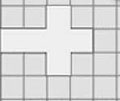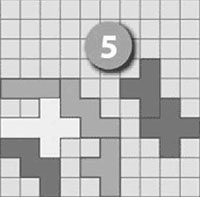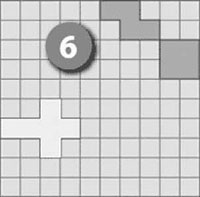Cathedral Game
Setup
Decide who will play the "Light" buildings and who will play the "Dark". Distribute the 28 buildings accordingly, placing them in front of the corresponding player.
Game Play
The Light player starts by positioning the Cathedral anywhere on the playing area, always respecting the grid squares. The Dark player makes the first and each alternate move.
 Strategic Moves
Strategic Moves

 End of the Game
The game ends when no further moves can be made by either player. If there are any unplaced buildings at the end of the game, the player whose buildings take up the least number of squares on the board wins the game.
Now play with the Dark player positioning the Cathedral first. At the end, the player with the combined lowest score wins.
Tips
End of the Game
The game ends when no further moves can be made by either player. If there are any unplaced buildings at the end of the game, the player whose buildings take up the least number of squares on the board wins the game.
Now play with the Dark player positioning the Cathedral first. At the end, the player with the combined lowest score wins.
Tips

 Strategic Moves
Strategic Moves- A move consists of positioning one of your buildings on the playing area, keeping it lined up with the grid squares. Once positioned, you may not move it.
- Neither you nor your opponent may claim space on your first move.

- Playing both offensively and defensively throughout the game, concentrate on claiming space early on by creating inner wall-to-wall connections that cannot be entered by your opponent (fig. 3), or, as another sequence shows, try to create inner wall-to-wall connections that will either surround the Cathedral (fig. 4a), or an opponents building (fig. 4b).

- If you enclose any ONE piece, be it the Cathedral (fig. 4a), or one of your opponent's buildings (fig. 4b), you MUST remove it from play IMMEDIATELY. If not, it remains where it is and the space is still available to your opponent.
- The opponent may replay the removed building as they choose. The Cathedral is not replayed for the remainder of the game
- If you enclose TWO or more buildings (fig. 5), one of which may be the Cathedral, no buildings are removed from play and the space is still available to your opponent.
 End of the Game
The game ends when no further moves can be made by either player. If there are any unplaced buildings at the end of the game, the player whose buildings take up the least number of squares on the board wins the game.
Now play with the Dark player positioning the Cathedral first. At the end, the player with the combined lowest score wins.
Tips
End of the Game
The game ends when no further moves can be made by either player. If there are any unplaced buildings at the end of the game, the player whose buildings take up the least number of squares on the board wins the game.
Now play with the Dark player positioning the Cathedral first. At the end, the player with the combined lowest score wins.
Tips
- Corner to corner contacts are not acceptable when creating inner wall-to-wall connections that cannot be entered by your opponent (fig. 6).

- Try to position your largest buildings first to claim space.
- The Cathedral is neutral and may not be used as part of your wall-to-wall connection to claim space. Your wall must be created with your own buildings.
- Be careful not to let your buildings get surrounded.
- You should not position your buildings in your own space while there is unclaimed space still available on the playing area.